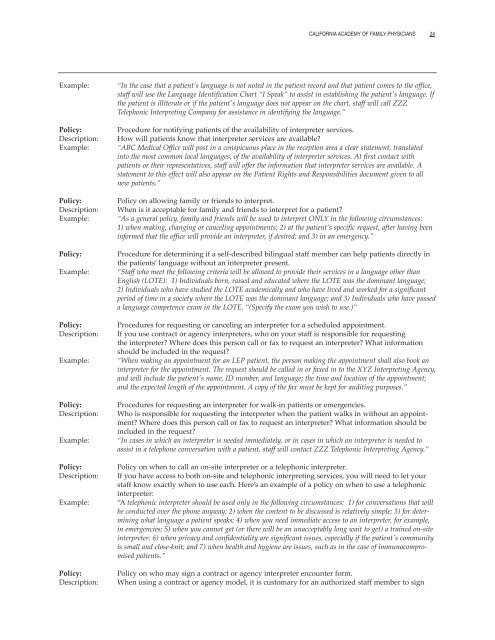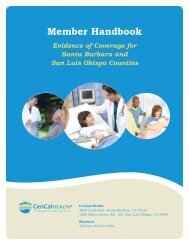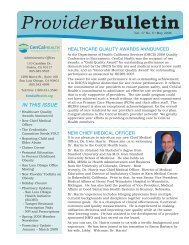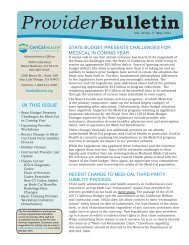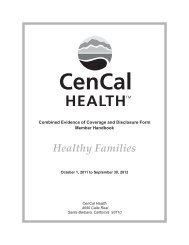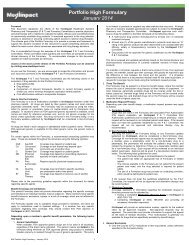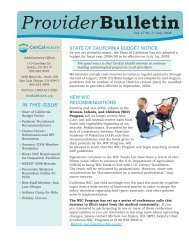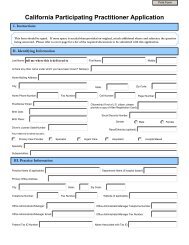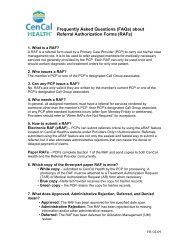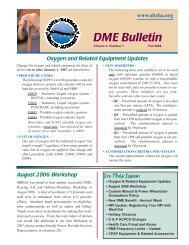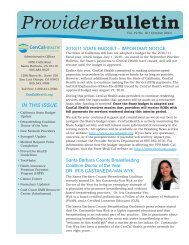Addressing Language Access Issues in Your Practice: A Toolkit for ...
Addressing Language Access Issues in Your Practice: A Toolkit for ...
Addressing Language Access Issues in Your Practice: A Toolkit for ...
Create successful ePaper yourself
Turn your PDF publications into a flip-book with our unique Google optimized e-Paper software.
CALIFORNIA ACADEMY OF FAMILY PHYSICIANS 24<br />
Example:<br />
Policy:<br />
Description:<br />
Example:<br />
Policy:<br />
Description:<br />
Example:<br />
Policy:<br />
Example:<br />
Policy:<br />
Description:<br />
Example:<br />
Policy:<br />
Description:<br />
Example:<br />
Policy:<br />
Description:<br />
Example:<br />
Policy:<br />
Description:<br />
“In the case that a patient’s language is not noted <strong>in</strong> the patient record and that patient comes to the office,<br />
staff will use the <strong>Language</strong> Identification Chart “I Speak” to assist <strong>in</strong> establish<strong>in</strong>g the patient's language. If<br />
the patient is illiterate or if the patient's language does not appear on the chart, staff will call ZZZ<br />
Telephonic Interpret<strong>in</strong>g Company <strong>for</strong> assistance <strong>in</strong> identify<strong>in</strong>g the language.”<br />
Procedure <strong>for</strong> notify<strong>in</strong>g patients of the availability of <strong>in</strong>terpreter services.<br />
How will patients know that <strong>in</strong>terpreter services are available?<br />
“ABC Medical Office will post <strong>in</strong> a conspicuous place <strong>in</strong> the reception area a clear statement, translated<br />
<strong>in</strong>to the most common local languages, of the availability of <strong>in</strong>terpreter services. At first contact with<br />
patients or their representatives, staff will offer the <strong>in</strong><strong>for</strong>mation that <strong>in</strong>terpreter services are available. A<br />
statement to this effect will also appear on the Patient Rights and Responsibilities document given to all<br />
new patients.”<br />
Policy on allow<strong>in</strong>g family or friends to <strong>in</strong>terpret.<br />
When is it acceptable <strong>for</strong> family and friends to <strong>in</strong>terpret <strong>for</strong> a patient?<br />
“As a general policy, family and friends will be used to <strong>in</strong>terpret ONLY <strong>in</strong> the follow<strong>in</strong>g circumstances:<br />
1) when mak<strong>in</strong>g, chang<strong>in</strong>g or cancel<strong>in</strong>g appo<strong>in</strong>tments; 2) at the patient’s specific request, after hav<strong>in</strong>g been<br />
<strong>in</strong><strong>for</strong>med that the office will provide an <strong>in</strong>terpreter, if desired; and 3) <strong>in</strong> an emergency.”<br />
Procedure <strong>for</strong> determ<strong>in</strong><strong>in</strong>g if a self-described bil<strong>in</strong>gual staff member can help patients directly <strong>in</strong><br />
the patients’ language without an <strong>in</strong>terpreter present.<br />
“Staff who meet the follow<strong>in</strong>g criteria will be allowed to provide their services <strong>in</strong> a language other than<br />
English (LOTE): 1) Individuals born, raised and educated where the LOTE was the dom<strong>in</strong>ant language;<br />
2) Individuals who have studied the LOTE academically and who have lived and worked <strong>for</strong> a significant<br />
period of time <strong>in</strong> a society where the LOTE was the dom<strong>in</strong>ant language; and 3) Individuals who have passed<br />
a language competence exam <strong>in</strong> the LOTE. “(Specify the exam you wish to use.)”<br />
Procedures <strong>for</strong> request<strong>in</strong>g or cancel<strong>in</strong>g an <strong>in</strong>terpreter <strong>for</strong> a scheduled appo<strong>in</strong>tment.<br />
If you use contract or agency <strong>in</strong>terpreters, who on your staff is responsible <strong>for</strong> request<strong>in</strong>g<br />
the <strong>in</strong>terpreter? Where does this person call or fax to request an <strong>in</strong>terpreter? What <strong>in</strong><strong>for</strong>mation<br />
should be <strong>in</strong>cluded <strong>in</strong> the request?<br />
“When mak<strong>in</strong>g an appo<strong>in</strong>tment <strong>for</strong> an LEP patient, the person mak<strong>in</strong>g the appo<strong>in</strong>tment shall also book an<br />
<strong>in</strong>terpreter <strong>for</strong> the appo<strong>in</strong>tment. The request should be called <strong>in</strong> or faxed <strong>in</strong> to the XYZ Interpret<strong>in</strong>g Agency,<br />
and will <strong>in</strong>clude the patient's name, ID number, and language; the time and location of the appo<strong>in</strong>tment;<br />
and the expected length of the appo<strong>in</strong>tment. A copy of the fax must be kept <strong>for</strong> audit<strong>in</strong>g purposes.”<br />
Procedures <strong>for</strong> request<strong>in</strong>g an <strong>in</strong>terpreter <strong>for</strong> walk-<strong>in</strong> patients or emergencies.<br />
Who is responsible <strong>for</strong> request<strong>in</strong>g the <strong>in</strong>terpreter when the patient walks <strong>in</strong> without an appo<strong>in</strong>tment?<br />
Where does this person call or fax to request an <strong>in</strong>terpreter? What <strong>in</strong><strong>for</strong>mation should be<br />
<strong>in</strong>cluded <strong>in</strong> the request?<br />
“In cases <strong>in</strong> which an <strong>in</strong>terpreter is needed immediately, or <strong>in</strong> cases <strong>in</strong> which an <strong>in</strong>terpreter is needed to<br />
assist <strong>in</strong> a telephone conversation with a patient, staff will contact ZZZ Telephonic Interpret<strong>in</strong>g Agency.”<br />
Policy on when to call an on-site <strong>in</strong>terpreter or a telephonic <strong>in</strong>terpreter.<br />
If you have access to both on-site and telephonic <strong>in</strong>terpret<strong>in</strong>g services, you will need to let your<br />
staff know exactly when to use each. Here’s an example of a policy on when to use a telephonic<br />
<strong>in</strong>terpreter:<br />
“A telephonic <strong>in</strong>terpreter should be used only <strong>in</strong> the follow<strong>in</strong>g circumstances: 1) <strong>for</strong> conversations that will<br />
be conducted over the phone anyway; 2) when the content to be discussed is relatively simple; 3) <strong>for</strong> determ<strong>in</strong><strong>in</strong>g<br />
what language a patient speaks; 4) when you need immediate access to an <strong>in</strong>terpreter, <strong>for</strong> example,<br />
<strong>in</strong> emergencies; 5) when you cannot get (or there will be an unacceptably long wait to get) a tra<strong>in</strong>ed on-site<br />
<strong>in</strong>terpreter; 6) when privacy and confidentiality are significant issues, especially if the patient's community<br />
is small and close-knit; and 7) when health and hygiene are issues, such as <strong>in</strong> the case of immunocompromised<br />
patients.”<br />
Policy on who may sign a contract or agency <strong>in</strong>terpreter encounter <strong>for</strong>m.<br />
When us<strong>in</strong>g a contract or agency model, it is customary <strong>for</strong> an authorized staff member to sign


